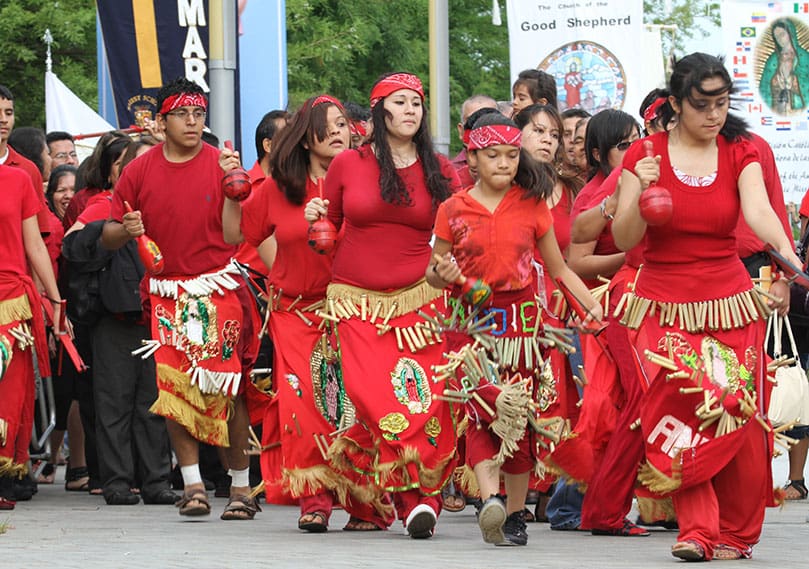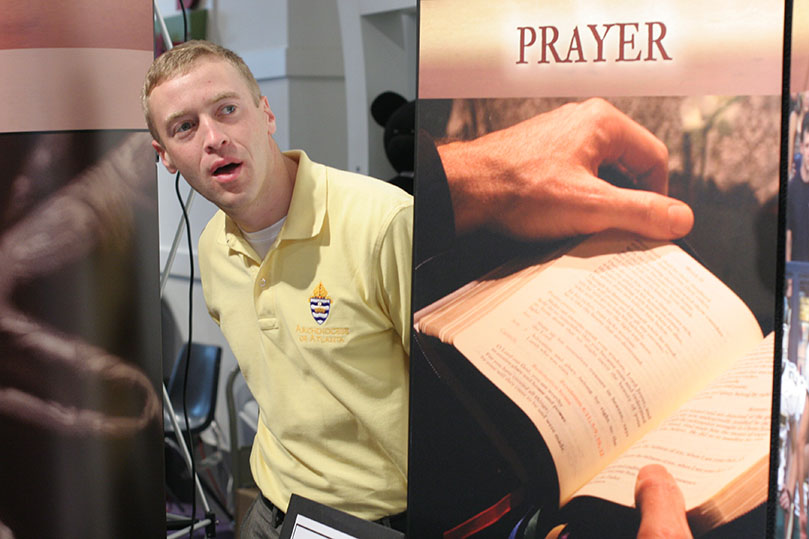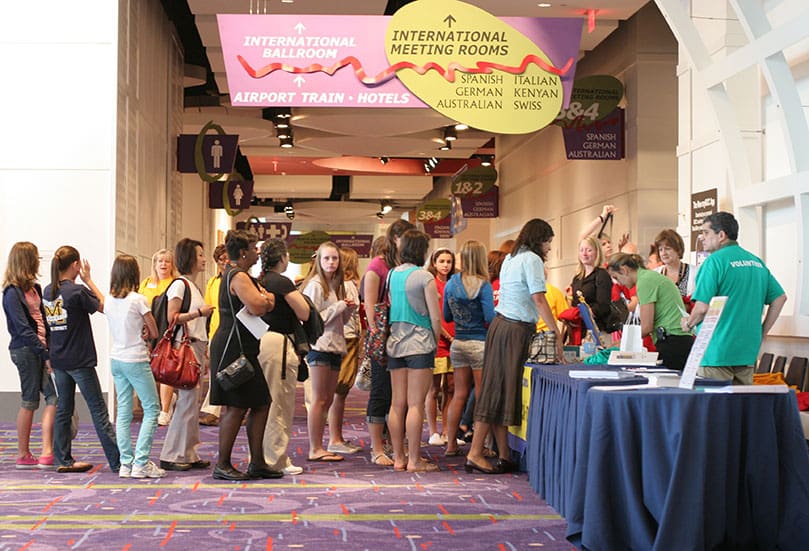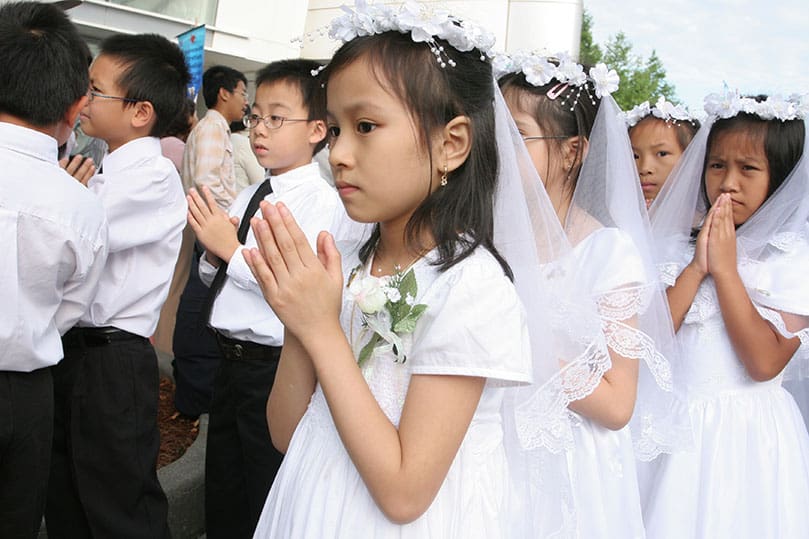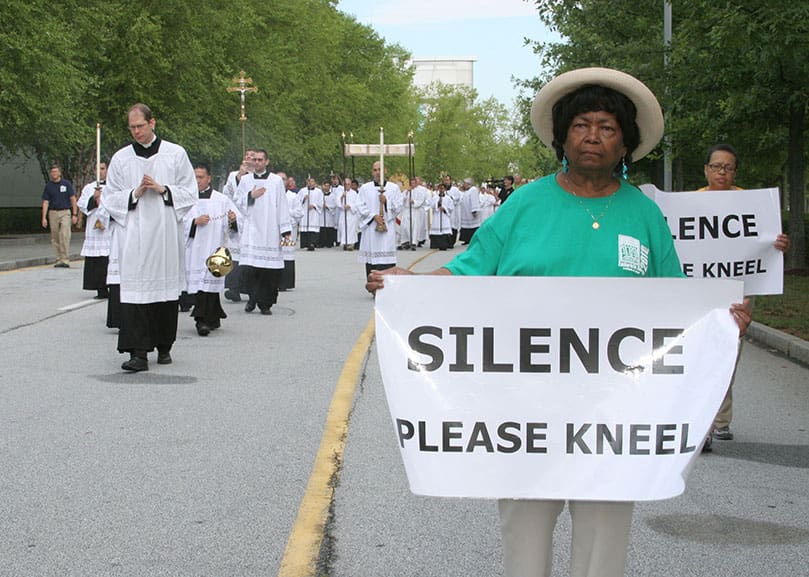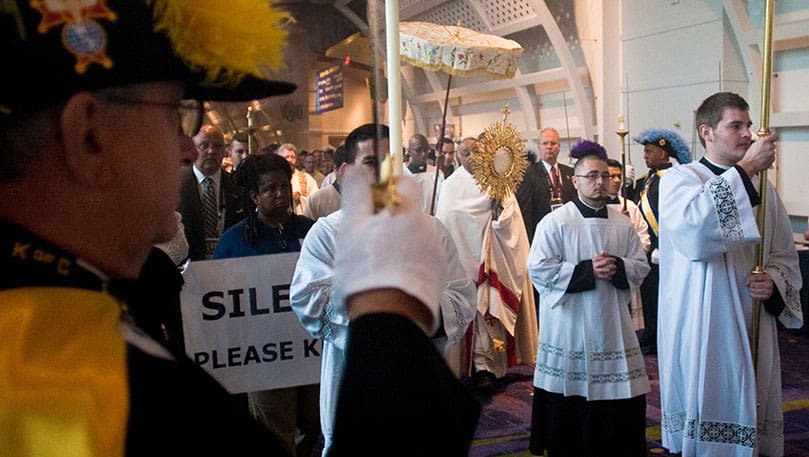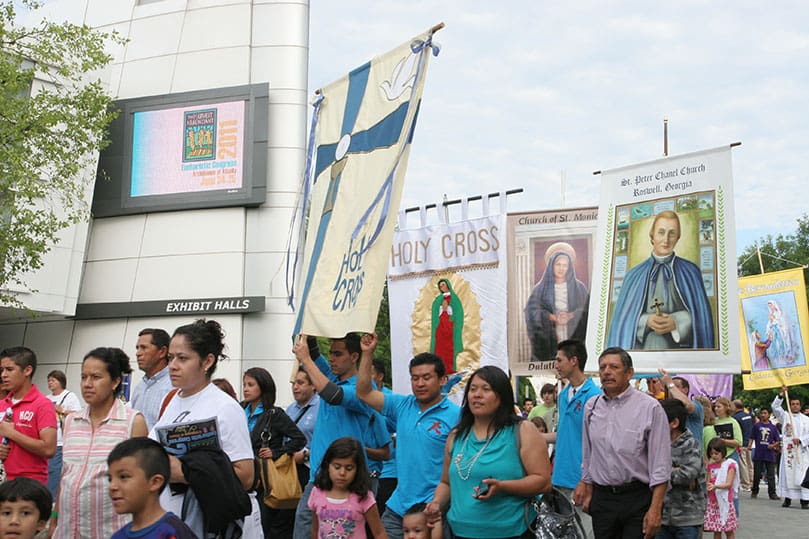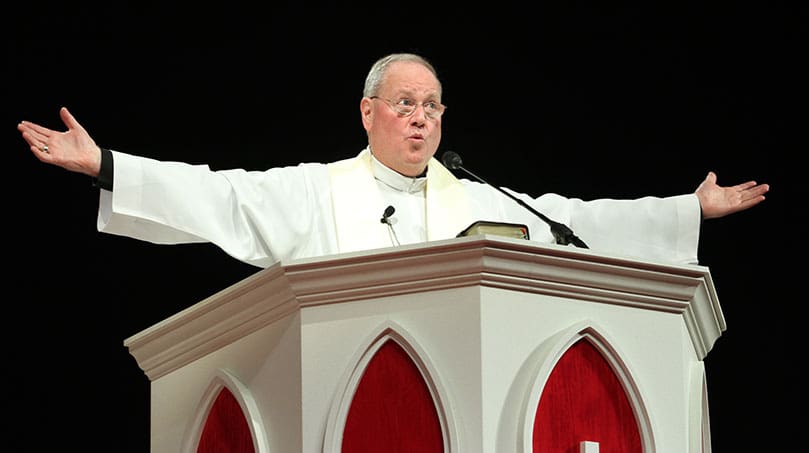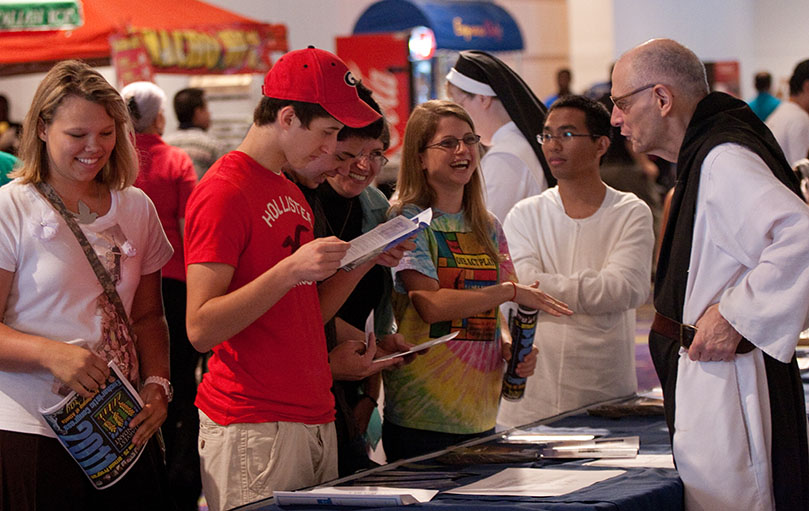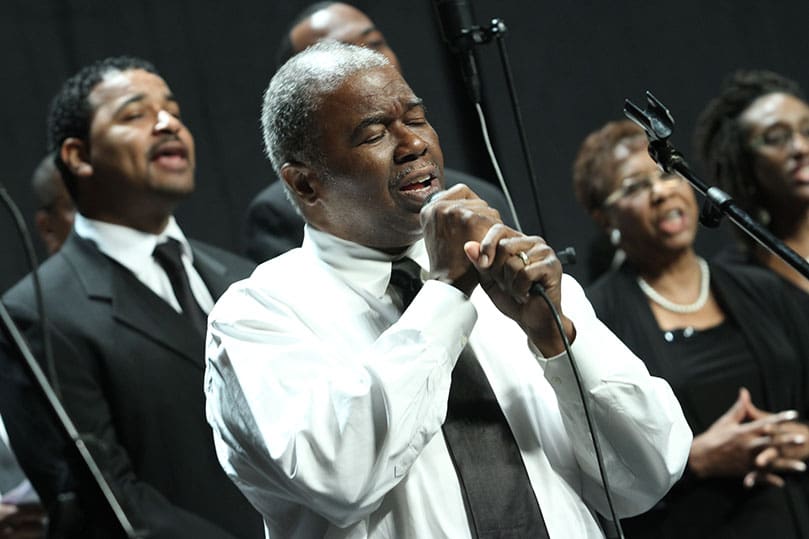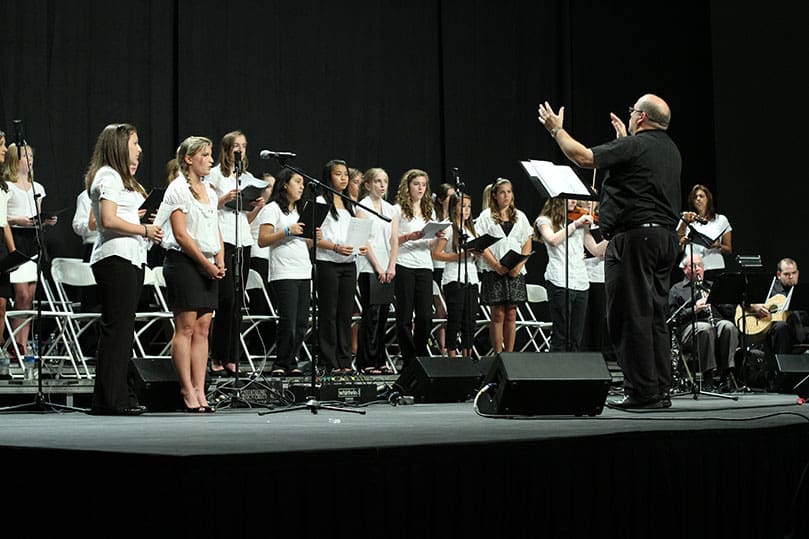Dancers from St. Clement Church, Calhoun, make their way toward the Georgia International Convention Center during the June 25 procession. Photo By Michael Alexander
College Park
Congress Sparks Faith In U.S., Archbishop Dolan Says
By GRETCHEN KEISER, Staff Writer | Published July 7, 2011
The Atlanta Eucharistic Congress draws 25,000 to 30,000 people together in the radiance of this miracle that Vatican II called the source and summit of the Catholic faith. The two-day event of processions, teachings, prayer, liturgy and community rejoicing around the Eucharist is such a witness that it has renewed faith in other parts of the country, said Archbishop Timothy M. Dolan of New York.
“I hereby proclaim Atlanta to be the Orvieto of America,” he said, as he spoke Saturday, June 25, at the congress during a morning service of exposition of the Blessed Sacrament.
In Orvieto, Italy, in 1264, Pope Urban IV first celebrated the worldwide feast of Corpus Christi. The Orvieto cathedral houses a linen cloth believed to display blood that miraculously appeared from the host during the consecration in a 13th-century Mass. Catholics believe in faith that the Eucharist is truly the body and blood of Christ. But the Corpus Christi feast fostered greater devotion to the Eucharist, inspiring St. Thomas Aquinas to write the Eucharistic hymns and prayers that endure today.
“With that miracle (of Orvieto), a renewal began in the church. It started with a renewal of faith in the true presence of Jesus in the Eucharist,” Archbishop Dolan said.
As the 16th annual Eucharistic Congress in the Archdiocese of Atlanta began, he said “your faith, your devotion has kindled this throughout our country.”
On June 25, the day began with a procession of the Blessed Sacrament including over 75 parishes, schools, ministries and spiritual groups marching into the convention center, flags and banners aloft, culminating in three parish groups of Hispanic children, youth and adults costumed and dancing to rhythmic drums in honor of Our Lady of Guadalupe.
At an opening Mass celebrated the night before, Auxiliary Bishop Luis R. Zarama said all people share a common vocation “to be holy.” The first miracle that is needed, he said, is to place your heart before Christ in the Eucharist and let him love you.
“Take the risk. Take that chance with your own heart to be embraced and to be loved and with that is freedom—freedom to become yourself. That is the moment when you will be able to make right decisions in your life,” Bishop Zarama said.
‘Jesus And His Church Are One’
The theme this year chosen by Archbishop Wilton D. Gregory was “The Harvest Is Abundant,” spotlighting the relationship between vocations of all kinds and the Eucharist. Sisters and priests, monks and brothers from many religious orders, as well as Marriage Encounter couples, talked to people as the crowds passed through the broad hallways of the Georgia International Convention Center, moving to tracks held for various languages and age groups, to confession, or to browsing in a marketplace of religious articles and books.
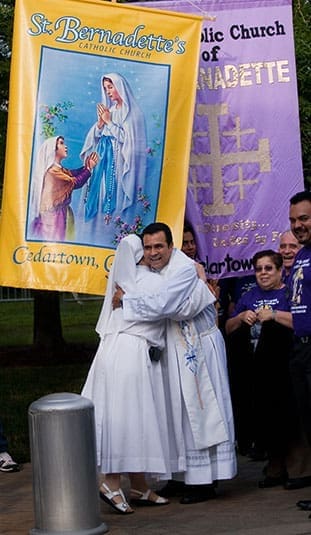
Sister Guadalupe Valdez from St. Joseph Church, Marietta, left, hugs Father Jose Duvan Gonzalez, pastor of St. Bernadette Church, Cedartown, before the procession of banners begin. Photo by Thomas Spink
A true vocation, whether it’s a religious calling or a vocation to marriage, whether it’s a commitment to public service or church ministry, is linked to the Eucharist, said Archbishop Dolan, because the sacred presence creates a space to listen to Jesus and hear him speak. Vocation means a call, he said, and to hear a call from God requires listening.
The celebration of the Eucharist assists people to find their vocation in two other important ways, said the New York archbishop.
“When we gather before the Eucharist we are in a posture of discipleship,” he said, like Mary, the model of attentiveness to God’s word and acceptance of God’s will.
“Once again we can picture ourselves walking on the shores of the Sea of Galilee and hear Jesus say, ‘Follow me.’ Once again we can watch in awe as he raises the son of the widow of Naim … and feeds the 5,000. … As we gather in front of the Eucharist, we are in a posture of discipleship, and from that there is a great harvest.”
At the Eucharist, he added, it is “dramatically evident” that “Jesus and his Church are one.”
When Saul, who had persecuted Christians, was knocked off his horse, he heard Jesus say, “Saul, Saul, why are you persecuting me?” Archbishop Dolan pointed out. “Christ identifies himself with his Church. Jesus and his Church are inseparable.”
“Today, we have people who say, ‘I want Christ without the Church,’” he said. “We say, ‘Impossible.’”
“Jesus brings baggage and that baggage is his Church,” he added. “We call the Church the bride of Christ … the mystical body of Christ. … The bride is not always beautiful. The body is not always sleek. … Yes, there is something wrong with us. That is why we need Jesus, that is why we have a (Church) family.”
“Love for Jesus and his Church must be the passion for your lives,” he said.
‘I Started Crying’
Focusing the huge crowd at the beginning of the day, Archbishop Gregory said he likes to think of the Eucharistic Congress “as both a celebration and an outreach.”
Elements of both streamed through the atmosphere in the convention center and in the comments of people.
Monica Duvall from the Birmingham, Ala., area said her husband came last year with two of their five children, and the children insisted the whole family come this year, along with their French exchange student. They came with another family of eight.
“My girls called me last year and said you would not believe how many people are here at Mass,” Duvall said.
“They were so excited and renewed in their faith after seeing so many people at Mass and at adoration,” she said. “What a gift.”
Russ Spencer, FOX 5 Atlanta news anchor, who emcees the English-language track each year, said, “It is one of the great privileges of my life.”
For many Catholics including himself, he said, “this weekend has assumed the place of a sort of cherished holiday,” that is always locked in on the calendar.
Carolyn Rhodes, a retired AT&T worker from Corpus Christi Church, Stone Mountain, was serving as a congress volunteer for the second time.
“It kind of renews me to go on the rest of the year,” she said, as she ushered. “It is so powerful. The speakers are very powerful. It helps me to go on through the year. It helps me to have more faith in God and in my religion.”
The congress is free and open to the public. Tracks are presented in English, Spanish, French, Portuguese, Vietnamese and American Sign Language and for youth, young children and young adults.

In the exhibitor’s hall crucifixes are displayed on a table featured by Fiat Religious Imports, of Asheville, N.C. Photo By Michael Alexander
The diversity of languages and styles of worship is evident, but people also commented often on the sense of welcome they felt and their experience of a common Catholic identity.
“I noticed that this year’s Eucharistic Congress was a lot more diverse—there seemed to be more Vietnamese communities and Latino communities attending,” said Rosemary Jean Louis. An Our Lady of Lourdes parishioner, Jean Louis has been coming to the event for the past six years with her mother.
Mary Bolinger and Iris Mease from Gaffney, S.C., watched as the young Hispanic dancers known as “matachines” from St. Clement Church, Calhoun, held the attention of a crowd of people.
The women came to the congress by themselves, having heard about it from a friend. They have been trying to establish adoration in their home parish. They were amazed when they visited the adoration chapel at the congress because so many people were in there, praying.
“To see all those people in the adoration chapel, that was moving,” Mease said. “I started crying. I was really moved.”
Bolinger said she was impacted “to see the vitality, to see the enthusiasm of these children and other people.”
“I see so much apathy” most of the time, she said.
‘We Feel Like We Are Home’
In the Portuguese language track held Friday night, June 24, the Blessed Sacrament was brought into the room in the monstrance and placed on an altar near a statue of Our Lady of Aparecida, patroness of Brazil. Redemptorist Father Celso Martins Jr. knelt before the monstrance, praying out loud and leading everyone in a time of worship and adoration. His loving voice spoke to the Lord while a group of 10 musicians and singers offered songs of praise.
A native of Brazil, now serving in Newark, N.J., Father Martins said the Brazilian people express their faith with great emotion. He said he prayed to God, “Give us your love. Give us your peace. Teach us to be generous. Teach us to help people, to love the Church.”

The monstrance, holding the real presence of Jesus, rests on the altar in the main exhibit hall before the thousands of people attending the 16th annual Eucharistic Congress at the Georgia International Convention Center, College Park. Photo By Michael Alexander
“I like to tell him our limitations,” he said.
Assigned to the United States in 2008, he said Newark “is a Brazilian city,” where his parish offers eight Masses every weekend in Portuguese. Devotion to the Eucharist is entrenched in the spirituality of Brazilian Catholics, he said. There is a weekly special Mass in Brazil called the Mass of the Most Holy One that focuses on the miracle of the Eucharist and includes a Eucharistic blessing, he said.
He said offering a Portuguese language track makes Brazilians and others “feel welcomed. This is really good.”
“We have different ways …We are more emotional, we like to sing,” he said.
Two of the musicians, who regularly play at Holy Family Church, Marietta, spoke of their appreciation for the work that goes on behind the scenes at the congress.
“Everything is organized. The environment is so friendly and welcoming. We feel like we are home,” said Juciane Sena.
“We feel right at home at this type of event,” added his wife, Paulene.
Father Martins said he also pointed to empty chairs in the Portuguese track and told those who came, “We need to put people in those chairs. We need to be missionaries. Take somebody who needs the Lord’s love and get them here.”
Luciano Lobo, 31, a lay missionary with the Cancao Nova Catholic community, said the immigration measure passed in Georgia this year may have kept some people from coming to the congress.
“All immigrants, they are afraid of the new law. They are all scared,” he said.
‘He Doesn’t Ask Us About Our Past’
Touching on the two Corpus Christi threads of outreach and celebration, Father Yvans Jazon, a multilingual priest, spoke in the Francophone track on the congress theme of the abundant harvest.
In an interview afterward he said, “We all are workers and the Lord calls all of us to work in his vineyard. He doesn’t ask us about our past. He wants us to work in his vineyard. …We need to be obedient. That is the only thing he asks.”
He gave the example of St. Matthew, a tax collector, who was called by Christ without any questions about his past or his worthiness.
“They (the apostles) were all obedient. He just called them and their lives were transformed,” Father Jazon said. “When you allow yourself to be transformed, it is a fruit of being obedient.”
A native of Haiti, now serving in a parish in Atlantic City, N.J., Father Jazon said of the congress and its volunteers, “It is amazing to me how people devote themselves to Christ.”
Two volunteers were assigned to help him throughout the congress, he said, adding that they must be getting tired of hearing him say “thank you.”
“I would be lost without them,” he said. “I think that is a wonderful thing.”
He said next year he hopes to come back with people from his New Jersey parish.

APeX Ministries’ Brad Farmer, center and Gene Monterastelli provide a mixture of juggling and storytelling with a Christian message during their performance. Photo by Thomas Spink
Marriage Encounter couples handed out some 300 information pamphlets about the Marriage Encounter weekend, an opportunity for couples with good marriages to spend a weekend together and learn new communications skills and rekindle their love. Some 50 couples registered for the chance to win a free registration to an upcoming weekend. At the next table, their Spanish-language counterparts spread the word about the weekend experience in Spanish.
“We are thrilled to see the archdiocese recognize and give (marriage) the status it so definitely deserves” as a holy vocation, said Al and Mary Nelle Connelly, Atlanta area leaders.
Many couples are not well prepared for the reality of living the sacrament of marriage, Al Connelly said. “Usually a few years in, disillusionment sets in.”
Through the weekend, the couple said, they reconnected with the person they fell in love with and it changed their family as their children were drawn toward the love their parents showed each other.
Another couple said they also experienced an awakening of the sacramental dimension of their marriage and how it reflects Christ’s love.
“You find each other, but you also find your sacrament, which is for the Church,” said Angel LaBate of the impact of Marriage Encounter on her married life with her husband, Jack. “It is a change of heart for each other and a change of heart for the Church.”
Sign Of Religious Vocations Needed In World
Sister Agnes Joseph, vocations director for the Sisters of the Third Order of St. Francis, explained the community’s work, administering Catholic hospitals in Illinois and Michigan, with sisters serving in many roles from lawyers to engineers and human resources, while living the religious life in Franciscan simplicity.
The witness of women religious is very much needed today, Sister Agnes Joseph said.
“Oh my, is there a need. The religious is a sign, an eschatological sign, of how things will be in the next world, totally dedicated to Christ. It is certainly needed in our world,” she said. “There certainly has to be something to respond to our culture. You hate to see a whole generation growing up thinking this is OK. It is not OK.”
At the tables, sisters from communities serving in the archdiocese, priests from religious orders, Trappist monks, archdiocesan seminarians, the Atlanta vocations office, and lay groups supporting vocations displayed photos, maps and information about the ways each serves Christ. All had a steady stream of visitors.
At an Alter Christus display, a group of teens stopped to write letters to seminarians telling them they were praying for them and adding their messages to a box filled with notes.
“I couldn’t be happier we are focused on vocations,” said Deacon Dennis Dorner, chancellor of the archdiocese and coordinator of the congress. “I am thrilled with the turnout of religious sisters. I think it is great. Too many young people have never seen a religious sister.”
Karen Vogtner, Catholic school principal and a member of the congress steering committee, said she was struck by how people participate in so many different ways but display a great unity because of their belief in Jesus’ presence in the Eucharist.
“When you are here in front of the Eucharist, everybody is one,” she said. “That is what is so wonderful. Everybody is doing different things, but then everyone comes together. It’s just great.”
She praised Archbishop-emeritus John F. Donoghue, who initiated a Eucharistic Renewal in the archdiocese that led to the annual Eucharistic Congress. “How it has grown,” she said.
The retired archbishop was warmly applauded several times as his role in fostering devotion to the Eucharist was mentioned. Archbishop Gregory noted that in 16 years, it was the first congress Archbishop Donoghue did not attend.
As he celebrated the closing Mass, the vigil for Corpus Christi Sunday, Archbishop Gregory said, “God’s abundance is the theme of this Eucharistic Congress.”
“He lavishes his love upon all people and provides for all of us beyond all imagining,” he said. “The Lord is always providing extravagantly for the needs of his Church.”
While “voices … suggest that we must change in order to have sufficient vocations,” he asserted, “that is not the way of the Lord of abundance.”
He said perhaps what is needed is “courageous and humble men and women” who will make a lifelong commitment to the vocation to which they are called.
“The harvest indeed is abundant,” Archbishop Gregory said. “May we leave this Eucharistic Congress filled with joy, with hope, with enthusiasm for tomorrow because the Lord of tomorrow resides within the heart of his Church and his grace is never in short supply.”
